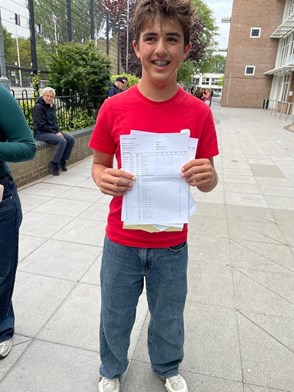THE number of students taking Religious Studies (RS) GCSE in England and Wales fell by 2.6 per cent this year — but it remains a popular subject that requires more specialist teachers, the Religious Education Council (REC) of England and Wales said on Thursday.
Last year, there was a small increase of 0.3 per cent in the numbers taking the course (News, 23 August 2024).
The REC said in a statement that RS was “the seventh most widely taken subject in England and Wales out of the 31 offered at Key Stage 4”, with 249,422 taking the subject.
The decline was steeper in Wales, where 10,988 students sat the GCSE: 11.8 per cent fewer than last year. In England, 238,434 sat RS GCSE: a decline of 2.1 per cent.
The number who achieved grade 4-9 rose by one per cent in England, to 73.2 per cent, and 2.1 per cent in Wales, to 67.8 per cent.
The REC expressed concern about a lack of specialist RE teachers, especially given the subject’s popularity. “School workforce data show that 51 per cent of those teaching RE mainly teach another subject while the number of RE teachers has remained roughly the same since 2011,” a statement said.
“The teacher training bursary for RE was restored in 2024 but at a much lower rate than subjects like Geography, Computing and Maths, but a shortage of specialism in schools is leading to teachers warning of tokenistic, low quality RS that risks embedding misconceptions, undermining societal cohesion.”
 Daniel Thornton, 16, a pupil at Twyford Church of England High School in Acton, West London, receives his GCSE results on Thursday. He was awarded ten grade 9s, one of which was in Religious Studies
Daniel Thornton, 16, a pupil at Twyford Church of England High School in Acton, West London, receives his GCSE results on Thursday. He was awarded ten grade 9s, one of which was in Religious Studies
The Chair of the REC, Sarah Lane Cawte, said on Thursday: “We have a worrying situation in our schools where one of the most widely taken GCSEs is taught by an ever-declining number of specialists. Too many in this enormous cohort continue to receive poor quality, tokenistic RE as an afterthought, something that threatens to undermine societal cohesion and leaves students poorly prepared for life in modern Britain. . .
“We now need a national plan that would restore Subject Knowledge Enhancement course funding, prioritise teacher recruitment and adopt the REC’s National Content Standard as part of the Department of Education’s statutory guidance to ensure all students receive their entitlement to high-quality, modern RE.”
The Chair of the National Association of Teachers of RE, Katie Freeman, congratulated students who had received GCSE results, as well as their teachers. RE lessons, she said, were “among the most challenging a teacher will ever deliver. RE teachers are hardworking, highly trained professionals who open up rich intellectual opportunities, helping young people flourish in their ongoing education, life and work.
“We must recognise their contribution to schools and society by providing religious education with its fair allocation of resources and attention to ensure this valuable work continues and reaches every young person.”
The day before GCSE results, the Archbishop of York read a prayer in a video posted on social media. “As you await your GCSE results let me offer this prayer and assure you that whatever the results, God cares for you and believes in you,” he said. “I pray that you will be able to persevere to become the person that you’re meant to be.”

















